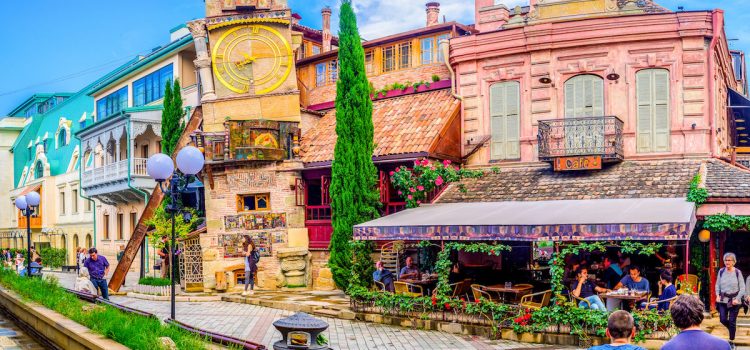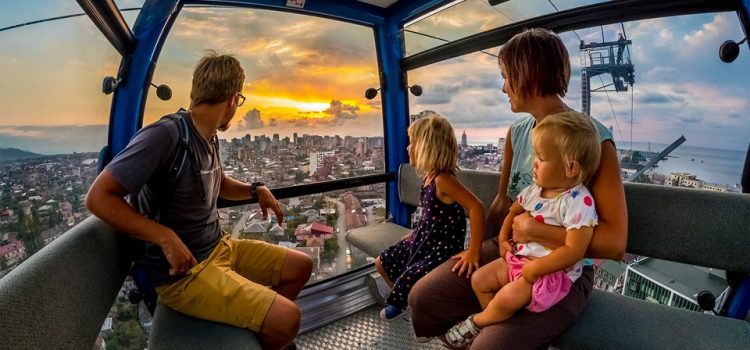Campaign ‘Spend Your Summer in Georgia’
Russian President Vladimir Putin has signed a decree prohibiting Russian airlines from carrying Russian citizens to Georgia from July 8. Putin has ordered the Cabinet of Ministers to help the citizens of Russia, who are traveling to Georgia, to return to Russia. Moreover, some recommendations have been issued for Russian tour operators, calling on them to refrain from selling tours in Georgia.
Subsequently, Russian airlines will stop selling air tickets to Georgia from July 8. According to Russian media, Smart, Pabeda, Red Drive and S 7 have already stopped selling tickets.
In response to the ban and the possible threats to the Georgian tourism industry, Georgian activists together with businessmen and international society have launched the campaign ‘Spend Your Summer in Georgia’. The campaign aims at popularizing Georgia as a travel destination to tackle the possible difficulties due to the decreased number of incoming Russian tourists. Besides, Russian tourists have encouraged their Georgian friends by saying that they will find other ways to reach Georgia.
Georgian airline companies are also launching Russia-Armenia-Georgia flights to help Russian tourists enter Georgia. Georgian businessman Mamuka Khazaradze is ready to cover 10 flights for Ukrainian tourists to support the Georgian tourism industry. Every day local as well as international support is getting stronger and stronger.
The ban was followed by the cancellation of the Inter-Parliamentary Assembly on Orthodoxy. The assembly was led by the President of the Inter-Parliamentary Assembly on Orthodoxy, Sergei Gavrilov, a deputy of the Russian Duma from the Communist Party. Angered by the presence of Sergei Gavrilov in Georgia, citizens gathered at the Parliament building in Tbilisi to protest Russian occupation in Georgia.
Source: www.Georgianjournal.ge
Why Tbilisi’s One of My Favorite Cities in the World
THERE ARE CITIES that make sense. The streets glide along straight, clean lines, their names uniform from start to finish. Bridges are crossable. Signs point in the proper direction.
Then there’s Tbilisi.
Riotous and anarchic, the capital of Georgia is anything but organized. Locals use Soviet-era street names—Leselidze, Davitashvili, Perovskaya—found only on decades-old maps. Wine is sold in repurposed Coca-Cola bottles for a dollar a liter from boulevard underpasses. The electricity still cuts out in the heart of the “Kala,” Tbilisi’s historic old town.
Despite this—maybe even because of it—this city is one of the best, most strikingly original travel destinations in Europe or Asia, if not the world.
Pop into an unmarked courtyard near the Armenian Norashen Church—overgrown with ripe pomegranates—and find yourself among well-fed stray cats in a bohemian artist’s studio (one of the workers may invite you for home-brewed, noxiously alcoholic chacha; he will not let you refuse, nor should you wish to).
Sneak into the basement of the red-brick seminary across from Sioni Cathedral and buy Tbilisi’s best bread—dough thrown against the scalding sides of a circular tone oven—from an elderly kerchief-wearing woman for 30 cents a loaf.
Head up a slanting set of town house stairs in the fin de siècle neighborhood of Sololaki and find yourself in a speakeasy-style apartment café called Linville, where tables hide behind vines on wrought iron balconies and afternoon tango milongas take place under decorative Victorian parasols.
Slip across the Dry Bridge, past the ruined frescoes of the former Grand Hotel, to the flea market and bargain with bearded ex-professors for wooden icons, Soviet-era gas masks, and Turkish tea glasses. Come more than once and the vendors will remember you (I buy my jewelry—traditional Georgian enameling—from the same seller every year; she recalls not just my taste, but that of the mother and grandmother I purchased gifts for).
The cliché, of course, is that Tbilisi represents the epitome of East meets West: a Silk Road crossroads where Arab, Ottoman, Mongol, and Russian imperial forces each left their own distinctive cultural mark. And in the heart of the old town, where rugs dangle from whitewashed wooden balconies and bearded Georgian Orthodox priests jostle with tourists on narrow cobblestone streets, it’s a compelling fantasy.
But the city’s reality is far more complicated—and intoxicating.
“East” and “West” are all but meaningless terms here, where the ancient fortress lording over old town has been used both by and against each set of conquerors, where the horizon—and the snowcapped Caucasus beyond—is punctuated by smoky Soviet tower blocks.
On Grishashvili Street, near the sulfur bathhouses—traditionally staffed not by ethnic Georgians, the by-far majority in this famously tolerant city, but by Muslim Azeris—a half-hidden chaikhana, or teahouse, serves baklava at carpeted banquettes before an open fire. A five-minute walk along the Kura River leads to Tartine—a French brasserie popular with expats and well-heeled locals alike—and café au lait delivered in gargantuan bowls. And at KGB, a restaurant whose tagline is “We’re still watching you,” Soviet kitsch takes on a hipster vibe.
Not all locals are as gleefully tongue-in-cheek about their city’s past, however. Shopping at the bazroba (bazaar), or feasting on caraway-spiced khinkali meat dumplings in wood-paneled working men’s taverns, you’re as likely as not to be dragooned into someone’s rhapsodic ode—in a mixture of Russian, Georgian, English, and fervently expressive gesturing—to the beauty of the mountains, the Virgin Mary, Mother Georgia, the tradition of hospitality, or women who happen to be in the vicinity.
Still, if Tbilisi has an aesthetic, it’s “retro collage.” Hidden bars like O Moda Moda—which doubles as a vintage clothing atelier—offer mulled wine and cocktails alongside traditional tarragon lemonade and syrupy Lagidze nectars served from massive soda fountains. Tbilisi’s most iconic eatery, Purpur, is a collection of mismatched tablecloths, 19th-century lamp shades, and crumbling flea market bric-a-brac.
But few places capture Tbilisi’s energy like the city’s hottest new restaurant, Café Littéra—brainchild of new celebrity chef Tekuna Gachechiladze—located in the palatial mansion that once housed the Soviet Writers’ Union. The food—chakapuli stew made with mussels instead of the traditional lamb, pomegranate-dusted river trout served a la tartare, classic badzhe sauce made, all but blasphemously, with almonds instead of the customary walnuts—reflects the best of Tbilisi’s breathless fusion culture.
Sure, the electricity might still go out at times.
But Georgians will light candles, shrug, and pour you another drink.
source: Nationalgeographic.com, by Tara Isabella Burton – regular contributor to National Geographic Traveler.


